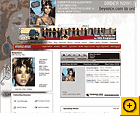"From unforgettable flame-outs to some of the most popular destinations around, no one is safe from our look at the world's dumbest dot-coms and silliest sites."
"People say hindsight is 20/20. When it comes to the Web, hindsight is more like X-ray vision: In retrospect, it's easy to see what was wrong with dot coms that tried to make a business out of giving stuff away for free (but making it up later in volume), or to make fun of venture capitalists who handed millions to budding Web titans who had never run a lemonade stand before, let alone an enterprise"
It's so easy, in fact, we can't help doing it ourselves. So as venture capitalists scramble to throw money at anything labled Ajax or Web 2.0, and Web publishing becomes so simple that anyone with a working mouse hand can put up a site, we offer our list of the 25 worst Web sites of all time.Many of our bottom 25 date from the dot-com boom, when no bad idea went unfunded. Some sites were outright scams--at least two of our featured Net entrepreneurs spent some time in the pokey. Others are just examples of bad design, or sites that got a little too careless with users' information, or tried to demand far too much personal data for too little benefit.
And to prove we're not afraid to pick on somebody much bigger than us, our pick for the worst Web site may be the hottest cyberspot on the planet right now.
Feel free to start at the bottom and work your way up, or jump ahead and read about the worst of the worst.
10. MyLackey.com
This Seattle-based site offered to walk your dog, pick up your dry cleaning, and do all other manner of scut jobs for a fee. (Isn't that what kids and younger siblings are for?) The dot com contracted with local service providers for the dirty work, but apparently applied the "lackey" notion to its own employees as well. An infamous memo from cofounder Brendon Barnicle berated the company's 65 employees for not putting in 11-hour days, making MyLackey a symbol of the dot-com work ethic. Sixteen months after it began, the last lackey still standing closed the doors and shut off the lights.9. Hamsterdance.com
Quite possibly the most irritating site on earth. Earplugs recommended.8. BonziBuddy
 This animated purple gibbon called itself "your best friend on the Internet," but many who downloaded this free program weren't feeling too friendly afterward. Buddy could tell jokes, recite your e-mail, manage your schedule, download files, and more. But the grape ape also tracked users' surfing habits, hijacked home pages, and installed several of his adware buddies. Depending on your browser settings, merely visiting Bonzi's Web site or clicking a banner ad could install Buddy on your machine. In 2002 annoyed Netizens had enough of this monkey business and sued Bonzi for deceptive advertising. By 2005 Buddy was history.
This animated purple gibbon called itself "your best friend on the Internet," but many who downloaded this free program weren't feeling too friendly afterward. Buddy could tell jokes, recite your e-mail, manage your schedule, download files, and more. But the grape ape also tracked users' surfing habits, hijacked home pages, and installed several of his adware buddies. Depending on your browser settings, merely visiting Bonzi's Web site or clicking a banner ad could install Buddy on your machine. In 2002 annoyed Netizens had enough of this monkey business and sued Bonzi for deceptive advertising. By 2005 Buddy was history. 7. Pets.com
Who let this dog out? Back in the heady days of 1999 it must have seemed perfectly normal to spend $175 million making a sock puppet famous. But the notion of saving some coin on kibbles and kitty litter never caught on with consumers, and by November 2000 Pets.com had been euthanized--going from IPO to liquidation in just nine months. Before it got sent to the pound, however, the dot com filed suit against Triumph the Comic Insult Dog for allegedly defaming its moth-friendly mascot. Apparently, even sock puppets have feelings.6. Pixelon.com
More dot con than dot com, this streaming media company boasted of a revolutionary new technology that would deliver high-quality audio and video over the Net. But Pixelon CEO and founder "Michael Fenne" was in reality a grifter named David Kim Stanley, who spent the majority of investors' money--some $16 million--on a launch party in Las Vegas featuring Tony Bennett, KISS, and The Who. Prior to starting Pixelon, Stanley had pleaded guilty to swindling friends and neighbors out of $1.5 million; he was on the lam and living out of the back of his car when he founded the company. Pixelon's revolutionary new streaming technology was equally spurious.5. AllAdvantage
 This site had the brilliant idea of paying people 50 cents an hour to surf and watch banner ads all day, plus another 10 cents per hour for every friend they convinced to sign up. All users had to do was install a "Viewbar" that displayed ads and clocked how much time they spent online. Stunningly, the company managed to raise $135 million in venture capital and convince 2 million users to sign up before it folded in February 2001. For some reason, advertisers failed to see any advantage in trying to reach the $4-a-day demographic. Go figure.
This site had the brilliant idea of paying people 50 cents an hour to surf and watch banner ads all day, plus another 10 cents per hour for every friend they convinced to sign up. All users had to do was install a "Viewbar" that displayed ads and clocked how much time they spent online. Stunningly, the company managed to raise $135 million in venture capital and convince 2 million users to sign up before it folded in February 2001. For some reason, advertisers failed to see any advantage in trying to reach the $4-a-day demographic. Go figure.4. CD Universe
In December 1999 a Russian hacker named Maxim broke into the music retailer's site, stole 350,000 credit card numbers, and then demanded $100,000 ransom. When CD Universe refused to pay, Maxim posted 25,000 of the numbers to a Web site. At the time CD Universe was owned by eUniverse, which combined its site and its customer database on an unprotected server. "Basically, they put the candy jar in plain sight and left the cover off," says current CD Universe owner Chuck Beilman. "It was only a matter of time until someone stole the candy." CD Universe's customer database is now separate from the Web site, encrypted, and protected by a firewall.3. Cartoonnetwok.com
No that's not a typo; it's "typosquatting," where a site owner deliberately registers a misspelling of a popular domain in the hopes of attracting the actual site's traffic. Cartoonnetwok was one of some 5500 deceptive domains owned by John Zuccarini, d/b/a/ "Cupcake Confidential." But that wasn't Zuccarini's only nasty bit of business. FTC investigators visiting one of his sites found their screens filled with 29 new browser windows for instant credit, online psychics, gambling, and porn sites. When they hit the Back button, another 7 windows opened--a technique known as "mousetrapping." Worse, many of Zuccarani's typosquatting sites were aimed at children. In 2003 Zuccarini pleaded guilty to violating the Truth in Domain Names Act and was sentenced to 2.5 years in the federal pen.2. CyberRebate
 The phrase "the check's in the mail" took on new meaning with this dot com. CyberRebate offered to refund 100 percent of what you paid for electronic goods, provided you a) paid up to 10 times their normal retail value, and b) let CyberRebate hold onto your money for at least 10 weeks. The site banked on people simply forgetting to apply for the refund. Unfortunately for CyberRebate, not enough of them did. The company filed for bankruptcy in May 2001 owing $60 million in refunds. Aggrieved customers had to settle for roughly 9 cents on the dollar.
The phrase "the check's in the mail" took on new meaning with this dot com. CyberRebate offered to refund 100 percent of what you paid for electronic goods, provided you a) paid up to 10 times their normal retail value, and b) let CyberRebate hold onto your money for at least 10 weeks. The site banked on people simply forgetting to apply for the refund. Unfortunately for CyberRebate, not enough of them did. The company filed for bankruptcy in May 2001 owing $60 million in refunds. Aggrieved customers had to settle for roughly 9 cents on the dollar.1. MySpace.com
 Yes, we know. With more than 90 million users, MySpace is now more popular than Elvis, "American Idol," and ice cream. But the Web's most visited destination is also its most poorly designed and counterproductive.
Yes, we know. With more than 90 million users, MySpace is now more popular than Elvis, "American Idol," and ice cream. But the Web's most visited destination is also its most poorly designed and counterproductive.The ease with which anyone of any age can create a page, upload photos, share deeply personal details of their lives, and make new "friends" quickly turned MySpace into a one-stop shopping mall for online predators. That in turn has made the site an easy target for politicians who pander for votes by playing on parental fears. In an era when the basic tenets of the Net are under attack by both Ma Bell and Uncle Sam, MySpace is a headache we don't need.
But let's put all that aside for a moment. Graphically, many MySpace pages look like a teenager's bedroom after a tornado--a swirl of clashing backgrounds, boxes stacked inside other boxes, massive photos, and sonic disturbance. Try loading a few of those pages at once and watch what happens to your CPU. Watch out for spyware, too, since it turns out that MySpace has become a popular distribution vector for drive-by downloads and other exploits. And in a place where "U are soooooooo hot!!!" passes for wit, MySpace isn't doing much to elevate the level of social discourse.
In response to a public backlash and some well-publicized lawsuits, MySpace has begun modifying its policies--for example, limiting adults' ability to contact minors. That's hardly enough. Requiring some kind of authentication from MySpacers--or their parents--to validate their ages and identities would go a long way toward scaring off the creeps and making the site a kinder, gentler social network.
Is MySpace totally bad? Not at all. Are we old farts? Yeah, probably. But the Web's most popular site needs a serious security reboot. And probably a makeover. Until then, MySpace won't ever be OurSpace.